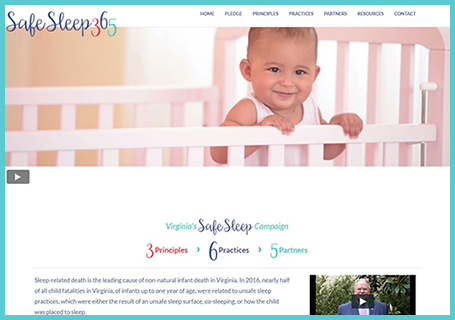Approximately 3,700 infants die in the United States from sleep-related deaths, including sudden unexpected infant death syndrome (SUID), accidental suffocation and strangulation. In a 2016 report, The American Academy of Pediatrics (AAP) reported nearly one in five sleep-related deaths occur while an infant is in the care of someone other than a parent or usual caregiver.
In a 2018 report, the Virginia State Child Fatality Review Team determined 87% of non-natural infant deaths between 2014 and 2016 were sleep-related in nature. The top four risk factors that often appear concurrently, as determined by the report, were:
-
soft bedding, such as blankets, pillows and stuffed animals (93%)
-
sleeping on an inappropriate sleep surface, such as a couch (85%);
-
co-sleeping/bed-sharing (52%)
-
second-hand smoke (50%)

The Virginia Department of Social Services created the Safe Sleep 365 website to educate parents and caregivers regarding safe sleep practices, which build on the core principles of Alone, Apart and Always. Visit www.SafeSleep365.com today for educational resources, tips and support.
Safe Sleep for Infants: Simple Practices Save Lives
- Lay your baby on their back for every sleep (don't worry if, as your child gets older, they can turn themselves over from this original position)
- Use a firm, child-appropriate sleep surface (couches and adult beds do not meet these safety standards)
- Room share without bed-sharing (try bringing a crib into your room, instead)
- No soft objects (toys, pillows or blankets) or loose bedding in the crib
- Place your baby to sleep in environment-appropriate clothing that is no greater than one layer more than you would wear
There are other easy practices that can contribute added protection against sleep-related infant death, such as maintaining a smoke- and substance-free sleep environment for your child.










